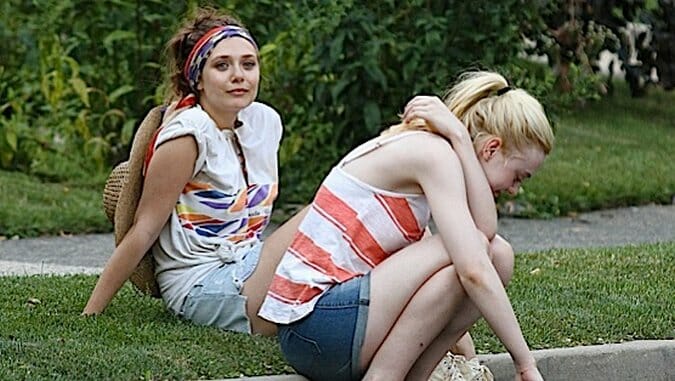Virginity obsessions and pacts to lose the same have informed all manner of raucous teen comedies over the years, but almost always from the perspective of young males. The decidedly slow-tempo coming-of-age drama Very Good Girls, however, focuses on the same quandary from the point-of-view of a pair of 18-year-old females. While appreciably different and well acted throughout, and sincerely engaging in patches, writer-director Naomi Foner’s film, starring Dakota Fanning and Elizabeth Olsen, ultimately succumbs to sigh-inducing artificiality.
Very Good Girls centers on two best friends, Lilly (Fanning) and Gerri (Olsen), and their last summer together before they’re separated by college. Charming, smart and lacking any sort of body issues (to open the movie they make a nude dash to the ocean in broad daylight at Brighton Beach), the pair nonetheless remain seemingly unable to attract the attention of any guys they like in return. Until, that is, they both meet David (Boyd Holbrook, tripling down on brooding masculine sulkiness), an ice cream vendor who, of course, also turns out to be a photographer with a cool, spacious loft.
Foner, the mother of Jake and Maggie Gyllenhaal and an Oscar-nominated screenwriter for 1988’s Running on Empty, directed by Sidney Lumet, seeds her movie with some nice little details; when one of her younger sisters is upset following the domestic turmoil in the wake of their father’s philandering, Lilly soothes her by offering to paint her fingernails. She also for the most part has a nice touch with actors and knows how to craft a mood. Cinematographer Bobby Bukowski delivers an attractive suburban palette that meshes with the characters’ upper-middle-class privilege, and Foner also makes nice use of music, from composer Jenny Lewis and her erstwhile band Rilo Kiley, whose discography lends the movie several songs, including one Gerri ostensibly pens for David.
But Foner gets the big stuff all wrong. The girls’ two-dimensional home lives are constructed solely to provide thematic contrasts and parallels (“You should be able to trust the people that mean something to you”), what with Lilly’s father (Clark Gregg) getting caught cheating on her mom (Ellen Barkin), and Gerri chastising her parents (Richard Dreyfus and Demi Moore) for their questioning of Lilly, saying, “Guys, she doesn’t come from a family where she has to train for dinner.” Also of note, virtually everything about the character of David—from his backstory to his integration into the narrative proper—is a total failure, exhibiting no real sense of how young guys treat girls, react to mixed signals or view their relationships with other female friends.
What most damns Very Good Girls, though, is its profoundly phony third act, which elicits no catharses but instead only a deep uncomfortableness at having to watch its actresses struggle to punch their way through wrongheaded conflict and resolution. If Foner’s film had instead just focused on two girls coming into their own emotionally and sexually, it would have been a much richer, believable and more rewarding movie.
The film’s strongest selling point lies in the connection between Fanning and Olsen, two young actresses who not only evince a great rapport together, but also line their performances with smart, small, telling nonverbal markers that communicate volumes about adolescent friendship in general and the bonds between females more specifically. With less intelligent actors, this entire concept becomes boring much more quickly. The palpable emotional connection between Fanning and Olsen, however, keeps things interesting—up to a certain point.
Director: Naomi Foner
Writer: Naomi Foner
Starring: Dakota Fanning, Elizabeth Olsen, Boyd Holbrook, Ellen Barkin, Clark Gregg, Richard Dreyfuss, Peter Sarsgaard, Demi Moore
Release Date: July 25, 2014
Brent Simon is a regular contributor to Screen Daily, Paste, Magill’s Cinema Annual and Playboy, among many other outlets, as well as a member and former three-term president of the Los Angeles Film Critics Association. You can follow him on Twitter and on his blog.
